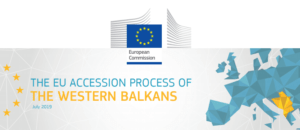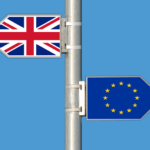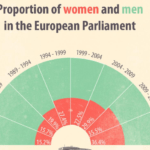At the Poznań Summit on the Western Balkans, the EU confirmed its commitment to strengthen cooperation with the region with a set of concrete measures focusing on five key areas: transport and energy, digital, economy, security and good neighbourly relations.
Heads of Government, Foreign Ministers, Ministers of Economy and Interior from the Western Balkans, together with their counterparts from several EU Member States and high-level EU representatives, met on the 4 and 5 of July in Poznań to strengthen regional cooperation between the Western Balkans partners, as well as between the region and the EU, and to further advance the European integration process of the Western Balkans.
Strengthening transport and energy connectivity within the region and with the EU
Improving connectivity within the Western Balkans, as well as between the Western Balkans and the EU, is a key factor for growth and jobs and brings clear benefits to the region’s and the EU’s economies and citizens.
Boosting the digital transformation of the region
To support the transition of the region into a digital economy and bring the benefits of the digital transformation,such as faster economic growth, more jobs and better services, Leaders welcomed the entry into force of the Regional Roaming Agreement on 1 July 2019. The agreement is an important achievement of the Digital Agenda for the Western Balkans and a prime example of the benefits of regional cooperation. Consumers will see a substantial reduction of their roaming charges within the region, with calls up to eight times cheaper and costs for data dropping.
In the area of broadband connectivity, an essential element for the digital economy of the region, the Commission announced new grants of €1.65 million to three projects to support the development of national broadband networks and improve digital connectivity in Albania, Montenegro and North Macedonia.
Supporting socio-economic development, economic integration and green growth
In the area of socio-economic development, the Commission
- Reported on progress achieved under the Guarantee Instrument. Launched in early 2019 under the Western Balkans Investment Framework, with an initial EU commitment of up to €150 million, the guarantee aims to leverage up to €1 billion in investments into sustainable socio-economic development and regional integration to unblock private investment and improve access to finance in the region.
- Signed Letters of Intent, together with international financial institutions, to reinforce the Western Balkans Enterprise Development and Innovation Facility by an additional €20 million to increase financial resources made available for SMEs based in the Western Balkans.
- Continues to support the region’s own plan to develop a Regional Economic Area, and welcomed the endorsement of the Mutual Recognition of Academic Qualifications Agreement.
To support the social-economic integration of the Roma population, Leaders endorsed the Roma Integration Declaration. The Leaders pledged to take the necessary steps to achieve concrete results in the fields of employment, housing, education, health, civil registration and non-discrimination.
In the areas of environment and climate, Leaders endorsed the joint Statement on “Clean Energy Transition in the Western Balkans”, signed on 21 February 2019. To build on this momentum, the Commission is ready to support the region’s efforts to develop a Green Agenda for the Western Balkans, which would strengthen regional cooperation and bring benefits to the well-being and the health of citizens in the region and neighbouring EU Member States while unlocking the potential of the green, low carbon and circular economy of the Western Balkans. The Leaders confirmed their commitment to an ambitious environmental agenda that contributes to fighting climate change.
Stepping up actions on security cooperation
The Leaders and Ministers took stock of the progress achieved in the cooperation between the Western Balkans and the EU to address shared security challenges, including in the fight against terrorism, radicalisation, cyberattacks, hybrid threats, organised crime and firearms trafficking. The link between corruption and security was discussed and representatives of the Western Balkans reiterated their commitment to tackle corruption.
Supporting regional cooperation and good neighborly relations
Regional cooperation and good neighbourly relations are at the heart of the countries’ path to the EU, which also entails achieving lasting and sincere reconciliation. The Summit was an opportunity for the Western Balkan partners to discuss bilateral issues and legacy of the past such as war crimes and missing persons. The EU continues to support the involvement of the Western Balkans youth – youth cooperation is key to increase regional connectivity – in many projects, such as the Marie Skłodowska-Curie Actions, the Creative Europe and Erasmus+programmes, and the Youth in Action window animated by the South East Europe Resource Centre (SALTO). Furthermore, the EU supports the work of the Regional Youth Cooperation Office (RYCO) to promote reconciliation and cooperation between the youth in the region.
Background
The Poznań Summit is part of the Berlin process, an initiative of several EU Member States supporting efforts towards strengthening regional cooperation and the European perspective of the Western Balkans.
For More Information
Factsheet on the EU accession process of the Western Balkans







Leave a Reply